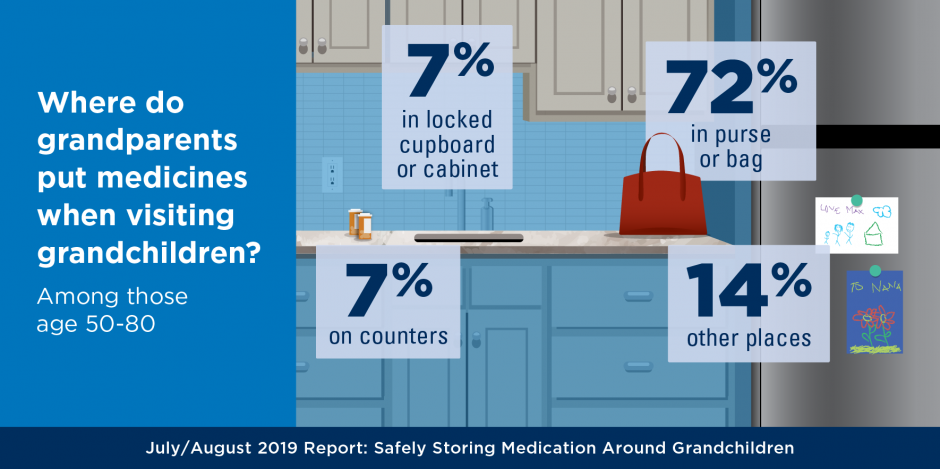
Introduction
Summer is the season for family vacations and visiting with grandchildren. While sun protection, water safety, and bike helmets are important precautions to keep in mind when spending time with grandchildren, one that may be overlooked is the safe storage of medications to avoid accidental ingestion or misuse. In October 2018, the University of Michigan National Poll on Healthy Aging asked a national sample of adults age 50–80 about caring for their grandchildren and how they store medications both at their own homes and when visiting the homes of their grandchildren.
Caring for grandchildren
More than half of adults age 50–80 (54%) identified themselves as grandparents (42% of those 50–64 and 74% of those 65–80). The majority (93%) said they have grandchildren under the age of 18. About one in ten (11%) reported living with children age 0–17. Most grandparents (86%) reported that their grandchildren had visited their home during the last year.
Overall, about two-thirds of grandparents (64%) reported providing care to their grandchildren. Two in five grandparents (42%) said they care for their grandchildren on a monthly basis, nearly one in five (18%) on a weekly basis (among whom 42% provide more than 20 hours of care per week), and 4% identified as primary caregivers (legal guardian or solely responsible for their grandchild’s care).

Storing medication
Nearly all grandparents (97%) reported having some type of medication in their home: 94% over-the-counter (OTC) medicines, 89% prescription medicines, and 86% vitamins or supplements.
While 71% of grandparents said they keep prescription medications in their original containers, others reported transferring at least some medications into other containers. About three in ten respondents (29%) used other types of containers for prescription medications, 23% for vitamins and supplements, and 13% for OTC medicines. Among the 29% of respondents who do not store prescription medications in their original packaging, the majority (83%) indicated they use easy-to-open containers or pill boxes.
Three in five grandparents (61%) said they store prescription medications in a cupboard or cabinet, 18% have them on the counter or table, 7% keep their medicines in a purse or bag, and 15% store them in other areas. Only 5% said they place their prescription medication in a locked cupboard or cabinet.
When their grandchildren come to visit, 84% of respondents say they keep their medicines in the same place they typically store them. When grandparents take their medicines to visits with their grandchildren, 72% keep medicines in their purse or a bag, 7% leave them on counter, and 14% keep their medicines in other places. Fewer than one in ten (7%) said they place them in a locked cupboard or cabinet when visiting their grandchildren.
Implications
More than half of U.S. adults age 50–80 are grandparents, and many regularly care for or visit with their grandchildren. While this time spent together can be beneficial for both grandparents and grandchildren, these visits may also present safety concerns. Each year, thousands of children are treated in emergency departments for consuming a medication they should not have. About 40% of the time, these accidental ingestions involve medications that belonged to a grandparent.
In this poll, one in four grandparents reported storing prescription medications in easy-to-open containers or pill boxes. While this may make medication adherence easier for grandparents, it can inadvertently increase the risk of accidental ingestion by children.
Keeping medications in a secure location (e.g., a locked cabinet) out of children’s reach can maintain ease of access to medications for grandparents while optimizing safety for grandchildren. Another important step for grandparents (and parents) to take is to put the Poison Control number (1-800-222-1222) in or near their phone.
Access to medications that could be intentionally misused or otherwise diverted to those for whom they were not prescribed is an additional risk of inadequate storage. Intentional misuse of prescription medications such as opioids is a growing national problem and may be a particular concern for those with older grandchildren. Ensuring that medications are stored securely and locked away can help prevent both accidental ingestion and intentional misuse.
Data Source and Methods
This National Poll on Healthy Aging report presents findings from a nationally representative household survey conducted exclusively by Ipsos Public Affairs, LLC (“Ipsos”), for the University of Michigan’s Institute for Healthcare Policy and Innovation. National Poll on Healthy Aging surveys are conducted using the Ipsos KnowledgePanel®, the largest national, probability-based panel in the U.S. Surveys are fielded two to three times a year with a sample of approximately 2,000 KnowledgePanel® members age 50–80.
This survey was administered online in October 2018 to a randomly selected, stratified group of older adults age 50–80 (n=2,051). Respondents were selected from the Ipsos web-enabled KnowledgePanel®, which closely resembles the U.S. population. The sample was subsequently weighted to reflect population figures from the U.S. Census Bureau.
The completion rate was 64% among panel members contacted to participate. This report is based on responses from 1,074 respondents age 50–80 who had grandchildren, including great grandchildren, step-grandchildren, or adopted grandchildren age 0–17. The margin of error is ±1 to 2 percentage points for questions asked of the full sample, and higher among subgroups.
Findings from the National Poll on Healthy Aging do not represent the opinions of the University of Michigan. The University of Michigan reserves all rights over this material.
Read other National Poll on Healthy Aging reports and about the poll's Michigan findings, and learn about the poll methodology.
Citation
Singer D, Solway E, Kirch M, Kullgren J, Malani P. Safely Storing Medication Around Grandchildren. University of Michigan National Poll on Healthy Aging. July/August 2019. Available at: http://hdl.handle.net/2027.42/149650